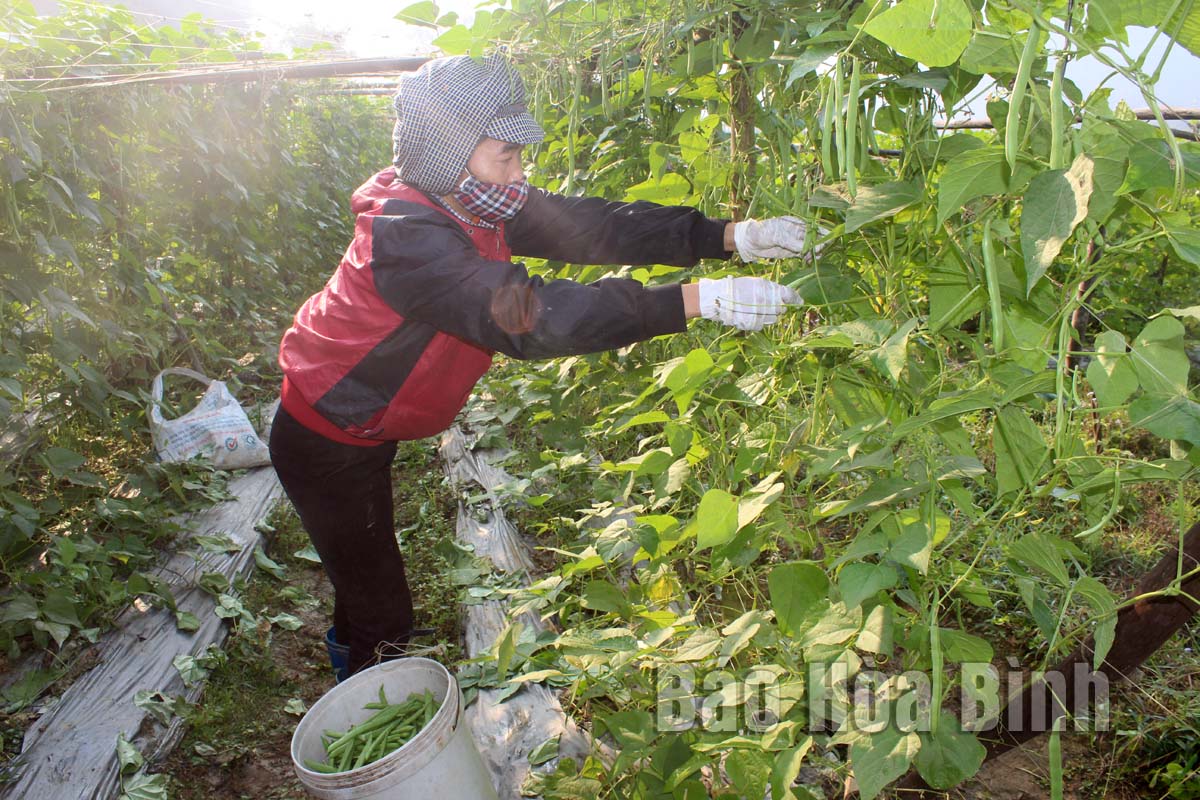
(HBO) – Winter crops are grown in fields in the foothills of Doc Lap commune in Hoa Binh city. Favourable weather this year helps raise productivity and quality of organic vegetables and it is harvest time.
Photo: A resident of Noi village in Doc Lap commune (Hoa Binh city) harvests bean cultivated under VietGAP standards.
Local farmers set up the Doc Lap agro-services cooperative in November 2020, with 10 full members and 70 collaborators. The cooperative is working on 2ha of crops bean, squash and leafy greens and 38ha under food safety standards.
Nguyen Trung Kien, head of the Doc Lap agro-services cooperative, said it holds regular training courses to provide local farmers with knowledge and techniques on safe vegetable farming in a bid to ensure safety standards.
The cooperative’s management board keeps a close watch on farming activities so that only safe products are sold.
Compared to those under traditional farming methods, vegetables grown under VietGAP standards rake in higher economic values of 20-30 percent, with stable output.
The cooperative has taken the initiative in introducing its vegetables to the Vinmart grocery stores and seek suitable ways to promote and sell its products in Hoa Binh city.
Vegetable farming brings higher economic values than rice farming, helping people in the mountainous commune of Doc Lap gradually escape poverty and prosper.
Doc Lap safe vegetable brand has strengthened its position and been trusted and favoured by consumers.
In addition to traditional products, the commune has begun to grow strawberry with a target of creating a staple of the mountainous region./.
The Standing Board of the Hoa Binh provincial Party Committee has agreed in principle on a proposal by the Standing Board of the Party Committee of Hoa Binh city to gather feedback on the city’s 1:2000 zoning plan, which forms part of its broader urban development strategy.
Hoa Binh province has made notable progress in public administration reform and digital government development, with the satisfaction index among citizens and businesses reaching over 84%, according to recent government evaluations.
Thanks to great efforts by local authorities in recent times, the governance and public administration performance of Mai Chau district has been significantly improved.
In the afternoon of June 6, the Party Committee, the People's Council, the People's Committee and the Fatherland Front of Lac Son district solemnly held a meeting to celebrate the 139th anniversary of the district's founding (1886–2025) and the 79th anniversary of the establishment of the district's Party Committee (1946–2025). There was the attendance of Mr. Bui Van Thang, the Vice Chairman of the Provincial People's Council; Mr. Quach Tat Liem, the Vice Chairman of the Provincial People's Committee; Ms. Dang Bich Ngoc, the Deputy Head of the National Assembly Delegation of the province; as well as the former leaders of the province and district through various periods, who are the natives of the district.
Implementing the Politburo’s Resolution No. 57-NQ/TW on breakthroughs in science – technology, innovation, and digital transformation is a golden opportunity for the northern mountainous province of Hoa Binh to renew growth model, improve competitive edge and shorten digital gap.
Resolution 57-NQ/TW, issued by the Politburo on December 22, 2024, identifies sci-tech, innovation, and digital transformation as strategic breakthroughs to build a developed and prosperous nation. In Hoa Binh province, this spirit is not just a slogan, it’s being put into action through concrete initiatives that form a "new development triangle”: digital citizenship, digital economy, and digital administration.



